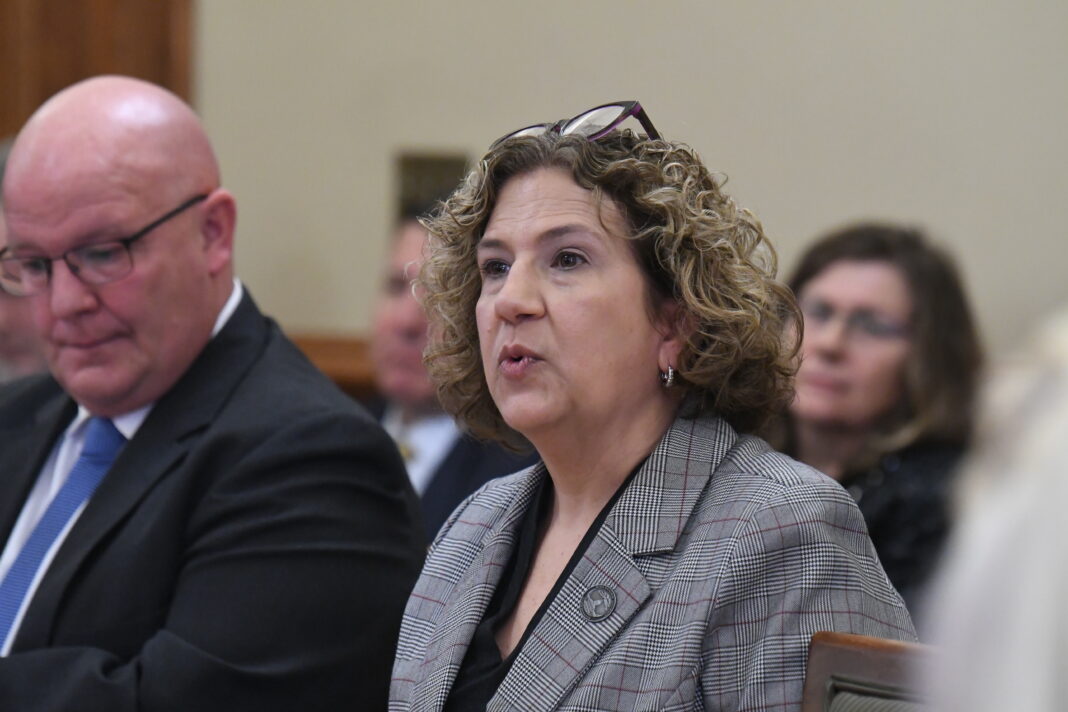An Iowa Senate subcommittee advanced a bill that would eliminate gender quotas for government boards and commissions in Iowa. Senate File 2096 was supported by Republican State Senators Jason Schultz and Chris Cournoyer but opposed by Democrat State Sen. Claire Celsi.
Schultz opened the subcommittee by saying that if the policy was ever right in the first place, it has “aged out” and women indeed have full access. Ultimately the bill allows the most qualified applicants to be considered for appointment regardless of their gender.
“I think that’s the best policy for Iowa moving forward,” he said.
Celsi asked Schultz how he knows women have full access.
“Women – biologically women – have,” Schultz said before Celsi cut him off.
“Oh, just women,” Celsi said.
“What is a woman,” Schultz asked Celsi.
“That’s not what this is about,” Celsi said.
“Oh I know, but I had to do that anyway,” Schultz said. “Women have held office and been elected to all of our officers, they have been increasing in number everywhere we look and we’ve actually reached a point where a former constituent has actually been rejected from the judicial nominating commission due to her gender. I think that would be a perfect example of how this policy holds back women as opposed to helping them.”
Celsi responded by asking Schultz if now he knows how women have felt for years being rejected from positions held by men.
“I’m going to leave your personal animosity out of it,” Schultz said.
Chuck Hurley of The FAMiLY Leader said he was the plaintiff in a successful federal court case focused on the issue. Hurley had an interest in being a judicial nominating commissioner but because of his gender, he couldn’t do it. An Obama-appointed judge, Stephanie Rose, ruled Hurley has the right to apply and that the Equal Protection Clause of the 14th Amendment provides no state should deny a person the equal protection of the laws.
“I would suggest that you pass the bill and make the code of Iowa in conformance with the United States Constitution,” Hurley said.
Peter Hird of the Iowa Federation of Labor said the group is opposed to the bill. He acknowledged the court ruling but said it may just be a difference in opinion and the gender quota law should be fought for.
Keenan Crow with One Iowa said if someone is holding an umbrella in a rainstorm, it’s true that person is no longer getting wet, but it isn’t true that the umbrella is no longer needed. And that is the case with the gender-balance law, he said.
The current law allows “substantial flexibility,” he said. If a qualified candidate cannot be found after three months, then the gender quota no longer applies.
“I hear over and over again how we want to preserve opportunities for women and girls,” Crow said. “So here’s our chance to do it.”
Connie Ryan with the Interfaith Alliance of Iowa is opposed to the legislation because America has a “long history” of providing opportunities only to “the few.”
“Those with power and siding with discrimination against those who hold little power,” she said. “Including women on public commissions and boards bolsters public trust.”
Karen Kedrowski, a political science professor at Iowa State, spoke against the bill because she believes the current law works. Kedrowski said while positive strides are being made to have female representation on these boards, women are still underrepresented across the state. She added that Iowa is the only state requiring gender balance on its public boards.
Alan Ostergren with The Kirkwood Institute represented Hurley in the case previously mentioned and testified in support of the bill. He said the law actually prohibits women from gaining positions because there are already too many females on boards or commissions.
“Whatever merit that this law had, its time has come and gone,” Ostergren said. “The legislature should improve the law by eliminating discrimination baked into our law with this gender quota law.”
Courtney Collier testified in support of the bill. She called out many of the opponents of the bill for their hypocrisy.
“I am a woman – an adult female human,” she said. “I am for this bill. And I just want to say to those in the room who commented against the bill and who regularly speak at the Capitol regarding their belief that gender is fluid, you’re contradicting yourself and I ask what is a woman?
“I’m a bit perplexed if we’re talking about balancing boards on gender, are we going to change Iowa’s code to balance the boards to include all of the 81 genders people now claim exist? The change in this law will allow the best-qualified person for the job to get the position on the board. Gender doesn’t matter, remember?”
Schultz added he was waiting for someone to point that out and he was glad it came from the public.
Celsi said in her closing comments that she comes from a generation that had “significant barriers to achievement” because of her status as a woman. Celsi said but for the gender-balance law, she never would have had a chance to serve on a local board.
“I had to wait six months to get on that board because of the gender-balance law but that was fine with me,” she said. “At least there was a place for me to serve. I can’t tell you how much this has meant to me personally and many women who I know and many women in this room. I just think it’s worth keeping and very important to have gender balance on our boards and commissions.”
Cournoyer said Title IX helped women make tremendous strides. As a woman in technology who also has served in law enforcement, Cournoyer said she sees the benefits of more women participating in those professions.
“The boards should be reflective of the people that they represent and some occupations just naturally are more dominated by men and some of them are more women,” she said. “When you are trying to find people just because of their gender whether or not they represent that occupation or not, I think that’s problematic.”
Schultz closed by pointing out that the ruling issued in Hurley’s case came from a lady judge, Gov. Kim Reynolds supports the effort as a female governor and a female Senate President (Sen. Amy Sinclair) who assigned the bill a subcommittee.
“It is time for Iowa to get beyond this ideological purity test and get on to merit and putting the best people in the best place,” he said.












